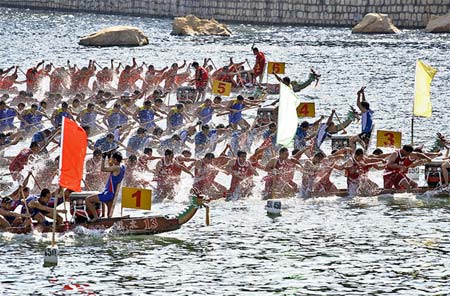
Origins
The Duanwu Festival originated in ancient China and, like other aspects of Chinese culture, spread to adjacent regions, such as Viet Nam, Japan and Korea, places that were historically influenced by sinitic culture. There are a number folk traditions, beliefs and explanatory myths connected to the observance. Today, the best, most widely known legend relates to the death by suicide of Qu Yuan, a Confucian scholar and minister to the King of Chu, in 278 BC an era in Chinese history that is referred to as the Warring States period. Scholars wrote literary works, including poetry. Qu Yuan is commonly referred to as a "poet" and a "statesman", however he is more properly considered as a ministerial Confucian scholar.
Qu Yuan
The best-known traditional story holds that the festival commemorates the death of poet Qu Yuan (c. 340 BC - 278 BC) of the ancient state of Chu, in the Warring States Period of the Zhou Dynasty.[4] A descendant of the Chu royal house, Qu served in high offices. However, when the king decided to ally with the increasingly powerful state of Qin, Qu was banished for opposing the alliance. Qu Yuan was accused of treason.[4] During his exile, Qu Yuan wrote a great deal of poetry, for which he is now remembered. Twenty-eight years later, Qin conquered the Chu capital. In despair, Qu Yuan committed suicide by drowning himself in the Miluo River on the fifth day of the fifth month.
It is said that the local people, who admired him, threw food into the river to feed the fish so that they would not eat Qu Yuan's body. This is said to be the origin of zongzi. The local people were also said to have paddled out on boats, either to scare the fish away or to retrieve his body. This is said to be the origin of dragon boat racing.
Wu Zixu
Despite the modern popularity of the Qu Yuan origin theory, in the former territory of the state of Wu the festival commemorated Wu Zixu (526 BC - 484 BC). Like Qu Yuan, Wu Zixu was a loyal advisor whose advice was ignored by the king to the detriment of the kingdom. Wu Zixu was forced to commit suicide by the king Fuchai, with his body thrown into the river on the fifth day of the fifth month. After his death, Wu Zixu was revered as a river god. In places such as Suzhou, in Jiangsu province, Wu Zixu is remembered during the Duanwu Festival to this day.
Indeed, many folkloric figures in Chinese literature and tradition drowned, both male and female, which is a type of ritual suicide in the same sense that seppuku in Japanese traditional culture is a manner of ritualistic suicide.
Activities
Three of the most widespread activities for the Duanwu Festival are eating (and preparing) zongzi, an angular rice ball wrapped in reed or bamboo leaves; drinking realgar wine, and racing dragon boats.
Other common activities include hanging up icons of Zhong Kui (a mythic guardian figure), hanging up mugwort and calamus, taking long walks, and wearing perfumed medicine bags. Other traditional activities including a game of making an egg stand at noon, and writing spells. All of these activities, together with the drinking of realgar wine, are designed to ward off disease or evil.